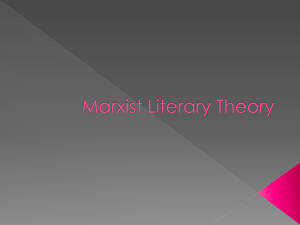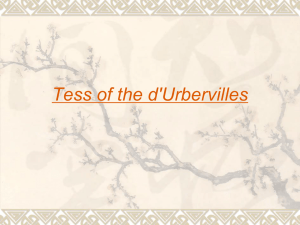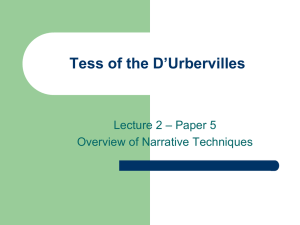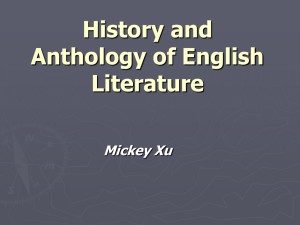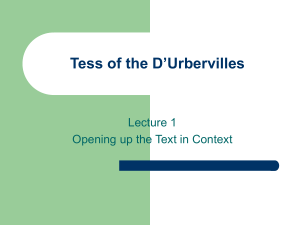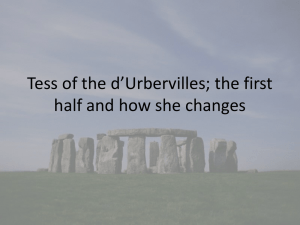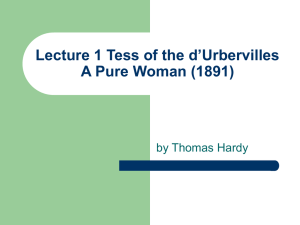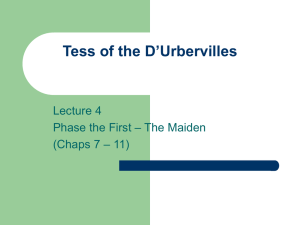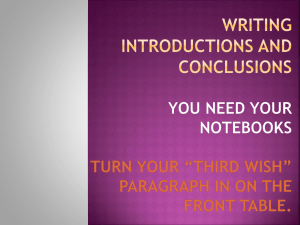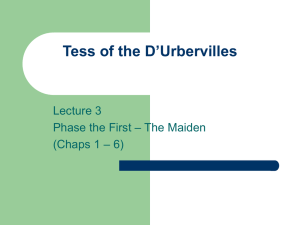Lecture 5 Tess of the D`Urbervilles
advertisement
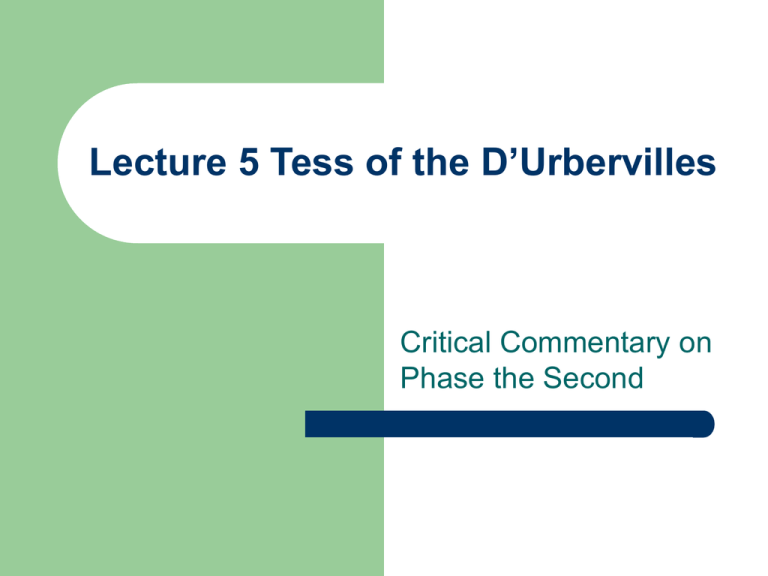
Lecture 5 Tess of the D’Urbervilles Critical Commentary on Phase the Second Highlights of Phase the Second: Maiden No More Tess after four months departs from the D’Urbervilles estate and decides to return home. A changed girl; ‘Verily another girl than the simple one she had been at home…’ ‘Almost at a leap Tess thus changed from simple girl to complex woman.’ [Chapter 15] Tess tries to explain her departure to her mother. Mother admits she is partly to blame for her daughter’s predicament, and resigns herself to making the best of the situation. For a time, Tess is the centre of attention in Marlott. Tess comes to suspect her friends are gossiping about her, and she sinks into a state of depression. By end of Phase the Second, despite her turbulent experiences, she was not demoralized. She resolved there should be no more D’Urberville air-castles. She would be the dairymaid Tess and nothing more. Accidentalism and Relationships The language of fate is given particular application to love and marriage. The general feeling about relationships between men and women is that meetings which lead to passion and perhaps to marriage come about through blind chance. The wrong people get married and real love is fated to remain unfulfilled or to result in shame and probably death. Tess is ‘doomed to be seen and coveted that day by the wrong man,’ [Note commentary, end of Ch 5] Focus of Lecture 5: Male-female relationships The economics of sexual relationships between classes Representations of Religion as an agent of patriarchal domination re- ‘Women in Literature’ Critically Significant Symbolism The novel’s dialogism: Representation of Voices Tess and Nature; the Tess-universe on solid ground Class Relationships The use of ‘sir’ to a man considered of higher rank, or to a stranger of equal rank, was obligatory in Victorian England Tess addresses Alec this way after his first rough attempt at intimacy: ‘I don’t want anyone to kiss me, sir.’ Even after she has borne his child, she rejects Alec’s later offer of marriage with ‘O, no sir – no!’ The response tells us much about class relationships in this socio-cultural milieu. Relationship Alec & Tess; Effects? Chapter 12 develops further and reinforces the master male - female slave relationship ‘…and she sat now, like a puppet, replying to his remarks in monosyllables.’ ‘My eyes were dazed by you for a little.’ ‘I didn’t understand your meaning till it was too late.’ Alec: ‘That’s what every woman says.’ Analyzing Effects In reading, we build up a sense of what kind of effects the language is trying to achieve (‘intention’) Understanding these textual effects, assumptions, tactics and orientations is just to understand the ‘intention’ of the work Notice a much more subdued Tess now comes within reach of the incline near Marlott, We are reminded this is where Alec drove a much more spirited Tess a few months prior. He verbally abuses her, demanding to KNOW why she left The Slopes [Intended] Effects of the writing? ‘She bowed to him slightly,’ ‘You are not going to turn away like that, dear? Come!’ ‘If you wish,’ she answered indifferently. ‘See how you’ve mastered me.’ She turned her head in the same passive way,….and he kissed the other side,…’ Read final paragraph of Chapter 13 It is hard for Tess to undo the ‘kiss of mastery.’ Tess has had a peasant girl’s training in submission to patriarchal traditional authority. Hardy shows how far those pressures are the product of conventional attitudes and practices which she has imbibed Although they are ‘anti-pathetic to her’ Ch 13 The Hunt Metaphor A pervasive metaphor is that of ‘hunting’ Several remarks and incidents are suggestive of Tess as being the ‘huntee’ Throughout, Tess is harried from place to place at what seems like increasing speed Even at the very start of her relation with Alec “the handsome, horsey young buck” drove up early in the morning in his gig to fetch her” Even the division of the novel into “phases” seems to further reinforce this—the idea of various phases of a hunt. When the hunt is comes to an end, we see Tess finally captured on the sacrificial stone at Stonehenge The stone where once like the hart at bay, the victim’s throat was slit with the knife The economic dimension ‘Very well,’ he said, laughing, ‘I am sorry to wound you.’ ‘Only you needn’t be so everlastingly flinging it in my face.’ ‘I am ready to pay to the uttermost farthing.’ Parallelism and Antithesis; and Note intended effects of Syntax You KNOW you need not work in the fields or the dairies again. You KNOW you may clothe yourself with the best, instead of in the bald plain way you have lately affected, as if you couldn’t get a ribbon more than you earn. [Intended] Effects of the writing? Tess: ‘I have said I will not take anything more from you, and I will not—I cannot!’ ‘I should be your creature to go on doing that, and I won’t!’ Alec: ‘One would think you were a princess from your manner, in addition to a true and original D‘Urberville—ha! ha! Well Tess dear’ Alec seems unable to recognize Tess’s right to refuse him. Commentary—Note: Alec drains the female vitality out of a woman Gives Tess only sensation Only experience in the senses, a sense of herself But nothing to her soul or spirit Thereby exhausting her, draining all that energy Hardy implies the meanness and cruelty of Patriarchal human law and Patriarchal human custom, (As much as the malignity of blind chance) All of which has prevented Tess from being her right and natural self as a person. Symbolism of the colour ‘Red’ Tess is approached by a man who appears to be an artisan carrying ‘a tin pot of red paint in his hand.’ The man turned as he spoke to an opening at the roadside leading into pasture. [a stile] Patriarchal voice of Religious Decree [The man] began painting large square letters on the middle board of the three composing the stile placing a comma after each word, as if to give pause while that word was driven well home to the reader’s heart— THY, DAMNATION, SLUMBERETH, NOT Note word choice: ‘Vermilion’— ‘the brilliant red colour of this pigment’ ‘Against the peaceful landscape, the pale, decaying tints of the copses, the blue air of the horizon, and the lichened stileboards, these staring vermilion words shone forth. They seemed to shout themselves out and make the atmosphere ring. Some people might have cried ‘Alas, poor Theology!’ at the hideous defacement—the last grotesque phase of a creed which had served mankind well in its time. Effects But the words entered Tess with accusatory horror. It was as if this man had known her recent history; yet he was a total stranger. The Patriarchal Textbook of Life ‘Do you believe what you paint?’ she asked in low tones. ‘Believe that tex? Do I believe my own existence!’ ‘But,’ said she tremulously, ‘suppose your sin was not of your own seeking?’ He shook his head. ‘I cannot split hairs on that burning query,’ Tess’s Tremulous Voice One of Hardy’s most favourite words was the word ‘tremulous’ [Latin tremulus] Characterized by or affected with trembling; shaking or quivering; timid or fearful Which he applied specially to the quality of the voice Characters such as Tess under stress of emotion speak ‘tremulously’ Note end of Chapter 29; Connections? Angel Clare: ‘Our tremulous lives are so different from theirs, are they not?’ he musingly observed to her… (Referring to the other three dairy maids) ‘Not so very different, I think,’ she said. ‘Why do you think that?’ Tess: ‘There are very few women’s lives that are not—tremulous,’ Tess replied, pausing over the new word as if it impressed her. Hardy’s Voices; Hardy as— Sceptical philosopher Local historian Topographer Antiquarian, Mediating between his ‘folk’—the agricultural community of Wessex And his readers—his metropolitan learned peers Patriarchal Religious Convention; Intended Effects? So the baby was carried in a small deal box, under an ancient woman’s shawl, to the churchyard that night, and buried by lanternlight, at the cost of a shilling, and a pint of beer, in that shabby corner of God’s allotment where He lets nettles grow and where all unbaptized infants, notorious drunkards and others of the conjecturally damned are laid. [Chapter 14] Effects Begins with subdued literal description of the pathetic particulars of the child’s burial. A hint of irony in the shilling and pint of beer Irony becomes more pronounced in the comment ‘That shabby corner of God’s allotment where He lets nettles grow’ Arising from the conventional idea that the cemetery is sacred, holy ground And thus implicitly God is then held responsible for the behaviour of His earthly impious representatives Tess associated and identified with NATURE throughout the novel This is enforced by insistent allusion to flora and fauna (both literal and figurative) Appearing early in the novel with ‘roses at her breast; roses in her hat…’ Ch 6 Her hair is ‘earth-coloured’ Ch 5 Her mouth is ‘flower-like’ Ch 16 Effect: Encourages us to think of Tess as essentially ‘in touch’ with Nature As novelist & critic David Lodge notes: Tess’s character is defined and justified by metaphors of flora and fauna, and the changing face of the earth both directs and reflects her emotional life. But it is also true that Nature is quite indifferent to Tess and her fate. Nature is simply ‘there.’ But indifferent. Its moral neutrality emphasized by the intrusive voice of the philosophical narrator. End of Phase the Second, we read: On one point she was resolved: She would be the dairymaid Tess, and nothing more. Closing sentence— It was unexpended youth, surging up anew after its temporary check, and bringing with it hope, and the invincible instinct towards selfdelight. [Note voice and tone of narrator]
